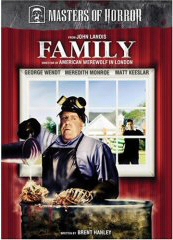
Veteran of both horror and comedy, John Landis has scored his greatest hits by combining both fear and humor, sprinkling them heavily with eroticism and unerring sense of irreverence. While he may be first known for such goofball comedies as the influential Animal House and such high profile films as Trading Places, to genre fans An American Werewolf In London represents the pinnacle of his creativity. In this and his other dark fantasies he is careful to find the horrid in the everyday and the punch line in the terrible. And what induces laughter more than someone else's misfortune, or a close escape from one's own? This question has brought Landis lasting recognition, for he understands that the same actions, thoughts, and emotions that make us afraid also make us horny, and that both death and sex, if taken with a grin, are easier to survive. This is precisely what made his earlier Masters of Horror foray Deer Woman such a treat, and what makes his contribution to season two even better. A medicine for mediocrity, Family is a melancholy darkly comedy that somehow manages to be both mournful and bitter even as it tickles your funny bone. Believable characters and unnerving (if not unexpected) plot twists inspire dread throughout, ensuring that the humor comes with a wince.
The plot of Family feels like is a folktale wrapped inside a dark comedy with psychological unease leaking from every pore. Written by Brent Hanley, the deceivingly simplistic script examines a couple who moves into a typical suburban dream home. David (Matt Keeslar) and Celia (Meredith Monroe) at first seem to be likeable and completely ordinary in their lifestyle. Soon, though, it becomes apparent that there is unspoken tension between them, something threatening their domestic bliss. And then there is their neighbor Harold (George Wendt), who lives a lonely unobtrusive life . . . until he becomes violent. Both David and Celia and Harold have dark secrets, and Harold wants to share his with Celia . . . Things so downhill from there, resulting in bloodshed and kink, all lit up by Landis's devotion to wicked humor, when Harold (a serial killer) decides to induct her into his 'family.'
Fear and laughter have been viewed as complimentary facets of similar human impulses since primal man first jumped upon seeing his shadow, and then laughed at himself for doing it. Fear and sex are two other unlikely yet perfectly matched bed fellows, varying degrees of emotional response to shared instincts. The shaman spinning tales by firelight knew this, as did our earliest scribes. Landis uses it like a scalpel in Family. It is rather amazing that themes of loss, grief, lust, madness, and revenge can inspire such a wide range of emotions. While not as effective as An American Werewolf in London, Family is much darker and far more serious. Landis achieves impressive heights of terror and pathos, not the least as a result of the script's fine sense of satire. Landis achieves a high degree of not only horror but disquiet, giving us an emotional discomfort that lasts long after the show has ended. He achieves his by subtly crafting the terror beneath a situation that at first plays itself out as normal, only subverting this image, and showing the true warped nature of the story, after we've been lulled into a false sense of security. A solid scare-fest!
Family is presented in anamorphic widescreen (1.78:1), enhanced for 16x9 televisions, and looks wonderful. Colors are bold and sharp, the picture is clear, and no grain or image depth problems are apparent. The DVD sounds as good as it looks, including Audio in Dolby Digital 5.1 and Dolby Digital 2.0. These tracks are clean sounding, with no scratching of muffled distortion.
Special features are plentiful and informative, including "Skin and Bones: The Making of Family," which explores the transition of the story from script to screen, and features various cast and crew members -- somewhat of a trademark now for the Masters of Horror series. More unique is the examination at the film's sound and musical score, "Terror Tracks". Most informative is the Audio Commentary with Brent Hanley, which brings him across as a both humorous and shrewd, discussing his experience working with Landis and the process of making words live on screen. Finally, there are original Storyboards by William David Hogan, a Still Gallery, and John Landis Bio.
Review by William P. Simmons
| Released by Anchor Bay/Starz |
| Region 1 - NTSC |
| Not Rated |
| Extras : |
| see main review |